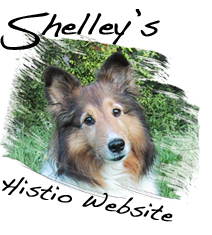
HOME
 YOUR HISTIO STORY
YOUR HISTIO STORY
I am looking for similarities
in all individual cases of
Histiocytic diseases.
I wonder if we all tell our
stories we might come up
with some commonality
between the specific
situations in which all of
our pets got this disease.
So please email me the
details and I'll put your
pets story on Shelley's
Histio Website
 UW HISTIO VERHAAL
UW HISTIO VERHAAL
Ik ben op zoek naar
overeenkomsten in alle
individuele gevallen van
Histiocytose.
Ik hoop dat wanneer wij
onze Histio verhalen
vertellen, wij overeen-
komsten ontdekken over
de manier waarop onze
huisdieren deze ziekte
hebben opgelopen.
Stuur mij de details en
ik zal het verhaal van uw
huisdier op de Histio
website van Shelley zetten.
 WARNING !
WARNING !
These stories are all
different. Individual
symptoms, situations
and circumstances
may vary and response to
therapy is not always the
same.
- Disclaimer -
 WAARSCHUWING !
WAARSCHUWING !
Deze verhalen zijn allemaal
verschillend. Individuele
symptomen, situaties en
omstandigheden kunnen
verschillen en de reactie
op therapie is niet altijd
hetzelfde.
- Disclaimer -
HISTIOCYTOSIS IN
OTHER LANGUAGES
German - Hund
Maligner Histiozytose
French - Chien
l'Histiocytose Maligne
Italian - Canis
Maligni Histiocytosis
Spanish - Perros
Histiocitosis Maligna
Dutch - Hond
Maligne Histiocytose
HOME
Chiara
Histiocytic Sarcoma
Beagle
Female
February 22, 1997 - July 27, 2007


Chiara came to us on July 27, 1997. Exactly ten years later to the very day, on July 27, 2007 we had to have her euthanized. By August 11th, 1997, we still had no name for our puppy. Inspired by the Feast Day of St. Claire --- Santa Chiara, celebrated on August 11th, we finally had something to call her. Chiara was willful, arrogant and stubborn --- determined never to cooperate, unless it bought her some tangible advantage --- usually food provided sufficient incentive. But she was also sensitive, needy of attention and loved being told what a good girl she was. I eventually discovered that I was able to elicit her cooperation by praising her (even if she were misbehaving) instead of scolding her. Scolding her was counterproductive because she'd always bark back with such indignation. Chiara did enjoy upsetting me, often deliberately being naughty just to get a rise out of me. It turned into one of Chiara's favourite games, upsetting me. I played along at times, pretending to be angry, other times I really did get angry. Her mischieviousness is what I miss most of all now that she's gone.
Soon after Chiara came into the house, I was diagnosed with a series of chronic illnesses. As soon as one went into remission, another emerged. We decided to get another beagle to keep Chiara company. The new dog was everything Chiara wasn't : timid, docile, too much of a coward to misbehave, always running away from us and hiding. The new dog turned out to be not much company for anyone, but we still loved her and learned to accept her shyness. Chiara, on the other hand, loved contact and closeness. My memories of Chiara during the worst periods of my illness are a vague awareness of her clamped into my side like a lamprey. What a comfort that was to feel her presence  when I was unable to do anything but lie in bed day after day. In April 2007, the last of my symptoms vanished and 10 years of illness finally ended. I thought it was a new beginning. I couldn't have been more wrong.
when I was unable to do anything but lie in bed day after day. In April 2007, the last of my symptoms vanished and 10 years of illness finally ended. I thought it was a new beginning. I couldn't have been more wrong.
July 2, 2007 - Chiara vomited, was listless and she didn't want to eat. Vomiting was nothing new with her. Our veterinarian had long surmised her regular vomiting could be a gastritis. But this time she refused to try eating again. This was unprecedented. In the past, even after getting sick, Chiara immediately got right back in there to attempt another pass at eating. She was always a good sport when it came to food ! We decided to take her to our veterinarian. He performed a blood test and from the results, believed she may have had a tick transmitted disease (either Lyme or Rocky Mountain Spotted Fever). He prescribed antibiotics. The same day, Chiara vomited her food along with her antibiotic so an anti-nausea medication was added. Chiara's condition seemed unchanged, but my husband and I weren't overly preoccupied because Chiara had just received her annual vaccines and check-up just two months prior and all seemed fine.
July 5 - We took Chiara back for a follow-up visit and blood tests revealed a worsening of her condition. Our veterinarian suspected the illness may have entered into her immune system so he added a prescription for Cortesone.
July 7 - I noticed Chiara's abdomen seemed bloated but I incorrectly assumed this was a side-effect of the cortesone coupled with the excessive thirst it caused. She was drinking so much water that I had to begin putting out two bowls.
July 8 - Chiara's condition deteriorated notably. It was Sunday and I regretted having to disturb our veterinarian at home. He offered to come right away but I decided to wait until 9am the following day when he arrived at his office.
July 9 - Blood analysis showed her condition had actually worsened (increased aenemia, lower platelet count etc.). Seeing Chiara's belly distended, our veterinarian used a needle to tap her abdomen and tried to remain nonchalent as blood came out, but I could see he was concerned . So was I. An ultrasound showed the dog's abdomen to be full of lesions. It wasn't certain from the ultrasound if the lesions were limited to her spleen or if multiple organs were involved. Surgery was advised, if for nothing else, to avoid an imminent massive internal hemorrhage caused by a spleen about to rupture.
 July 10 - Chiara underwent a successful splenectomy. The tumours were indeed limited to her spleen, which had grown to about six times the normal size and weighed over a kilo (circa 2.5 lbs.), traversing her abdomen and decending down to her bladder. This distension of her spleen is what caused some confusion in reading her ultrasound to understand which organs may have been invaded by growths. The cytology analysis did confirm cancer but Chiara responded well to the surgery and seemed to be making some progress in the days following.
July 10 - Chiara underwent a successful splenectomy. The tumours were indeed limited to her spleen, which had grown to about six times the normal size and weighed over a kilo (circa 2.5 lbs.), traversing her abdomen and decending down to her bladder. This distension of her spleen is what caused some confusion in reading her ultrasound to understand which organs may have been invaded by growths. The cytology analysis did confirm cancer but Chiara responded well to the surgery and seemed to be making some progress in the days following.
July 17 - Blood analysis showed improvement of platelet counts, aenemia etc.
July 20 - We returned to the veterinarian have Chiara's stitches removed. The histology report had also come back confirming histiocytic sarcoma. Because the tumors appeared to be localized to the spleen and this was the only tissue analyzed, there was no certainty whether we were dealing with a diagnosis of a localized or disemminated histiocytic sarcoma. Our veterinarian kindly printed up some information on the illness. The prognosis for both localized or disemminated histiocytosis was not good, but Chiara seemed well so we were optimistic that we would have some more time together.
July 21 - Chiara's condition suddenly worsened. She was limping and began walking with great difficulty. She remained at rest, groaning frequently, and moved with great reluctance. She just lay in her little bed with her eyes open as if she were afraid to close them. I found all this very disturbing. She had to be carried up and down stairs and outside and no matter how gently she would be set down, she would yelp and howl in such pain. We returned back to the veterinarian. Blood analysis showed her condition to be stable but her symptoms indicated the illness had metasticized. We felt certain we were now dealing with a disseminated histiocytic sarcoma. Chiara was given an injection of cortisone which provided some relief.
July 23 - We were back to the veterinarian in the morning and everything seemed fine. Later that day, Chiara took another backslide, limping more noticibly and in greater pain. I was told to administer cortesone orally in small doses but it didn't seem to help manage her pain.
July 25 - Chiara returned to the veterinarian for more blood analysis. The results showed a radical change from being nearly normal the previous July 21, to being far from the normal range. We knew the disease was progressing rapidly.
July 26 - We had to speak with our veterinarian about euthanizing Chiara. He agreed it was probably the most correct action to take. He sent us home with an opiate pain medication to keep her comfortable and we agreed to bring Chiara the next morning to be euthanized. I stopped off at the supermarket to buy some steaks. Chiara enjoyed her meal. I was happy that she was still able to eat. I administered her medication hoping it would make her last night comfortable and pain-free. Unfortunately, it turned out that the medication provoked such respiratory distress that I felt certain she wouldn't make it through the night. Her breathing was so frantic and desperate, her eyes wide open and terrified. I stayed up with her all night lying beside her, petting her and talking to her so she wouldn't feel alone.
 July 27 - At dawn, Chiara's breathing returned to normal but her level of pain was very high. I still wasn't prepared to lose her but the illness progressed quickly, her condition deteriorated rapidly, she was in terrible pain which could not be managed, there was no hope left --- and yet, I still felt as if I were giving up on her. Despite having many dogs prior to Chiara, I was fortunate to have never had to euthanize any. I was not prepared for this. At 10:00 we took her to be euthanized --- parting with her exactly ten years to the very day we got her.
July 27 - At dawn, Chiara's breathing returned to normal but her level of pain was very high. I still wasn't prepared to lose her but the illness progressed quickly, her condition deteriorated rapidly, she was in terrible pain which could not be managed, there was no hope left --- and yet, I still felt as if I were giving up on her. Despite having many dogs prior to Chiara, I was fortunate to have never had to euthanize any. I was not prepared for this. At 10:00 we took her to be euthanized --- parting with her exactly ten years to the very day we got her.
If I had to cite the most disturbing element of Chiara's illness it would have to be the celerity of it's progress --- mere weeks from the diagnosis to her death --- I wasn't expecting her condition to deteriorate so rapidly.
I can't recall precisely when it started, but about four years before her diagnosis, Chiara began vomiting --- occasionally at first, then more regularly. Our veterinarian presumed this could be gastritis and recommended frequent, small feedings. This seemed to reduce the frequency, but Chiara still had fairly regular vomiting bouts. Another peculiarity was that four years before being diagnosed with histiocytosis, Chiara developed a slight but distinctive body odor. The reason this is so peculiar is that immediately following her splenectomy, as she was coming out of anesthesia, I was petting her and snuggling her and whispering in her ear. I immediately noticed she no longer had her "smell" but instead, she smelled rather sweet, pleasant, almost perfumed. Thinking it was too odd to mention, I said nothing to our veterinarian nor to my husband, who noticed on his own, asking me, "Did they bathe her before her surgery? She no longer has that smell". I would never mention this to a "scientist" because it would be dismissed as "irrational", but I wonder if Chiara's slight body odor had some link to her cancer. It seems too coincidental that her distinct odor which she had for several years would immediately disappear --- and never return --- immediately following her splenectomy. I also wonder if her vomiting could have been related to her eventual illness. If histiocytosis has such a rapid onset and progression, it would preclude such a theory, except to explain the final months of vomiting. Unfortunately, these symptoms were too subtle for any of us to believe there was anything seriously wrong with her, because, despite the vomiting, which is not entirely unusual in some dogs, and the body odor which is also not uncommon in dogs, Chiara seemed quite healthy, robust, intrepid and with plenty of character and attitude ! I miss her willful stubborness and how she would indignantly bark at me if I dared try correcting her. Even when she was caught in the very act of misbehaving and I would scold her, she would let out with indignant howls and have a look on her face as if to say, "I don't have to put up with this !"

